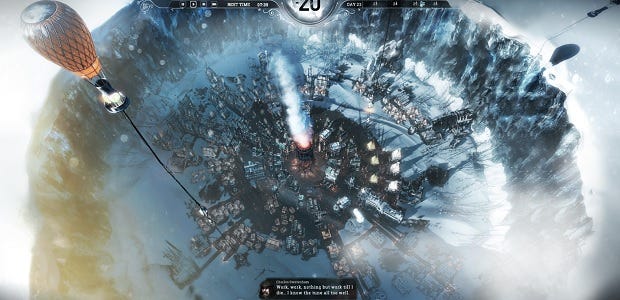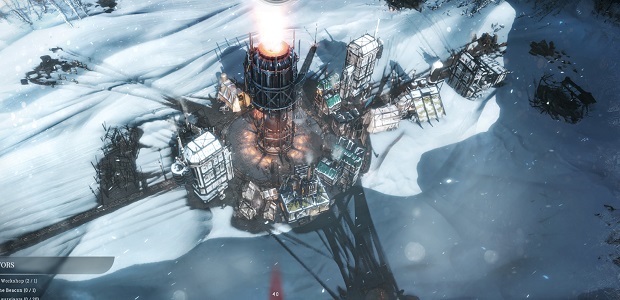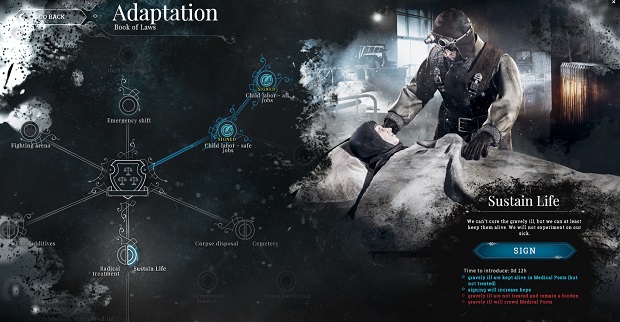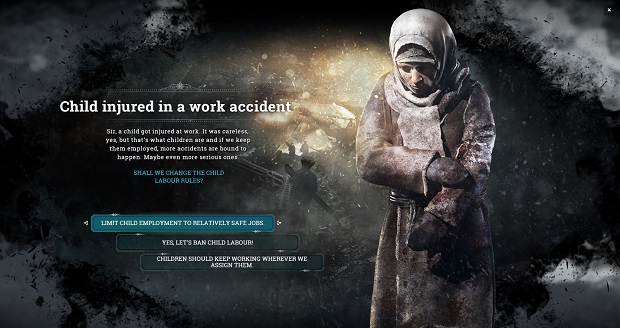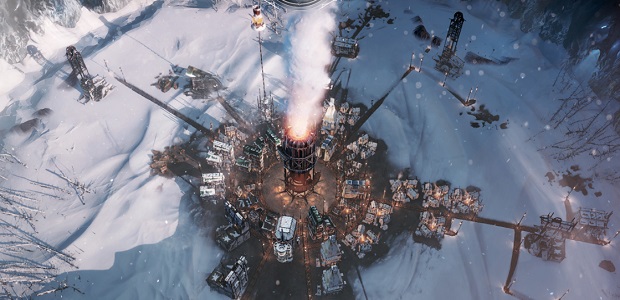Frostpunk asks why we survive, not just how
Baby, it's cold inside
In the first week, we put the children to work. They weren't forced into dangerous jobs, so we told ourselves, but when you're living on the brink of extinction, what work is truly safe? One afternoon, a man collecting coal complained of numbness in his arm. Frostbite had taken hold. We could have left him to die but instead we opted for an experimental treatment.
He lost the arm and he's no longer capable of contributing to our dying society. One more mouth to feed with no body of work beneath it. What should we do?
Frostpunk [official site] is a city-building survival sim from the studio that brought us This War of Mine and it is beautifully bleak.
Though it's a science fiction story, set in a frozen future barely capable of sustaining human life, it shares some of that previous title's contemporary concerns. Climate change is the obvious one, this being a world undone by a dramatic temperature shift, but as you dig into the details, there are questions about equality, labour and the scarcity of natural resources that make the crater-town of Frostpunk an unhappy microcosm of just about every society you might choose to name.
It's also an icy cocktail of cinematic and real world inspirations: the crash of Uruguayan Air Force Flight 571 (filmed as Alive), Aron Ralston's Utahmputation (filmed as 127 Hours) and Captain America and the railway children (filmed as Snowpiercer), among many others. There's also a rich vein of Victoriana, but not simply in the [Blank]Punk sense; here there are shadows of the workhouse and Blake's 'weeping chimneysweep.' The beating hea(r)t of the generator that keeps these people alive is also the new birth of an industrial age, and the factories and mines operate on blood and sweat.
Your job is not just to plan, it's to inspire, or at least to ensure that hope doesn't die out. It's as vital to survival as the flames of the generator and how unusual it is to see Discontent and Hope listed as gauges of success. There are more conventional resources as well, particularly coal in the early stages, but you're trying to support life rather than mere existence.
That means you'll have to be careful not to make promises you can't keep. I'm the kind of person who will always try to do right, as I see it, where a game gives me the choice. Frostpunk certainly gives choices, but sometimes there are no good options, or presenting a manifesto of unattainable optimism will simply lead you down a path where the epitaph reads: “It's the hope that kills you”. Or, to be more precise: “It's the false hope that made them kill you.”
I'm not sure if a possible endgame has the survivors turning against their leader (you) and casting them out into the cold, or stringing them from one of the generator's girders, but breaking promises will see hope crumble and discontent rise. Early on, your people might ask for tents to protect them from the cold, to provide at least a thin layer of protection. That should be an easy promise to fulfill, but when they start asking for changes to the laws of your new society, or for construction that would require sacrifice or postponement of other plans, you should think long and hard about whether to make those promises.
All of this goes back to the game's own initial promise, that this is a game about finding reasons to survive rather than just the means to go on living. And that's why you might decide that giving food to people who can no longer work is important, because a society must look after its own, but it's also why you might have to reverse that policy if injuries pile up or the weather deteriorates. In an RPG where moral choices spring into a dialogue tree, I only ever pick the nasty options if I'm roleplaying a nasty character. By framing these choices in a citybuilder, where management of resources is key, 11bit are aiming to create genuine dilemmas. There's a very real chance that playing my way, trying to do the right thing, will create a chain reaction that leads to death and ruin down the line.
And that's why you might end up clicking a button that legalises, and actively encourages, cannibalism. Not because you're the edgelord of Coldsville and want to call your people The Eaters of the Dead, but to save the lives of those who haven't already become meat. It's why you might marvel at the trails your workers cut through the snow as they trudge to work at the fringes of the crater on day one, but will shrug when they fall in the deep white and stop moving by week three.
It's important to note that even without the complexities of moral choices and policy-making, Frostpunk makes the most of its setting. The crater that contains the generator, right at the centre, allows for construction that treats the layout as spokes on a wheel rather than lines on a grid. Buildings snap to the generator and then to each other, creating circular layers that suit the setting perfectly. The form fits the theme, naturally creating a shantytown sensibility as tents and medical centres cluster and huddle around the warmth of the generator.
Frostpunk is a difficult game. Not in terms of the challenge it presents but in the way it is marrying two distinct genres and forcing bleak decision-making that is tied to its systems rather than its narrative. There is a story to uncover, which will presumably tell us something about how the world came to be as it is, and whether anything like a happy ending is possible. You can learn a little about the world beyond your crater by sending out expeditions, and through balloon-related observation, but the generator is home. And home is where the heart breaks.
Frostpunk is scheduled for release this year.
